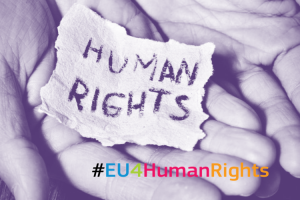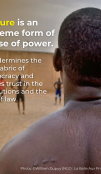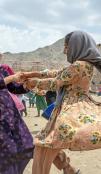Nigeria: EU Annual Report on Human Rights and Democracy in the World 2020 Country Updates

Nigeria
1. Overview of the human rights and democracy situation
The human rights situation in Nigeria remains highly complex with significant differences across the country, with a number 138 of violent and escalating conflicts, particularly in the North East, the Middle Belt and the North West, and diverging trends on various human rights issues. The secondary impacts of the COVID-19 pandemic and the measures taken to address it (e.g. lockdown, restrictions of movement) have increased unemployment, poverty and worsened the human rights situation. Abuses by security forces enforcing lockdown were witnessed; there was a surge in sexual and gender-based violence; resources were syphoned off from humanitarian aid; a declining security and a shrinking economy led to civil unrest and crime. In October, Nigeria faced three weeks of large-scale protests against the controversial Special Anti-Robbery Squad (SARS) and police brutality in general. The protests became a conduit for the youth to vent their anger, and gradually turned from peaceful to violent with several casualties perpetrated by Nigerian security forces and widespread looting across the country. In contrast, the civic space remained vibrant. Investigative reporting has made the media (in particular the new media) an effective and credible watchdog and boosted its credibility among the public. Social media played a key role during the #EndSARS protests.
The situation in the North East remains one of the worst humanitarian and protracted crises in the world, with allegations of security forces abuses in the campaign against insurgents. The International Criminal Court announced that the statutory criteria for opening an investigation into atrocities perpetrated by both the Nigerian Security Forces and Boko Haram in Nigeria's North East had been met. In the North West, violence and lawlessness has increased, where recent attacks include pillaging, kidnapping for ransom, burning and looting of entire villages, indiscriminate killing of civilians and gender-based violence. In turn, the North Central region continues to be plagued by repeated clashes between farmers and herders over access to natural resources as well as wider communal violence. In the South, criminal gangs and crime syndicates known as 'cultists' are widespread. Cultists threaten, extort, kidnap, rob, rape, traffic human beings and drugs, participate in oil bunkering and fight over territory causing collateral damage to innocent by-standers. Piracy has enduring implications for human rights, where the Gulf of Guinea is the stage to more than 90% of the world’s kidnappings for ransom at sea. Trafficking in human beings remains a profitable undertaking due to its low prosecution and conviction rate. The number of emblematic cases of people in detention also raise concern. These include death sentences (a de facto moratorium on carrying out these sentences is in place since December 2016), prolonged detention without trial, lack of transparency and access to justice, including, but not limited to the cases of: Mubarak Bala, Yahaya Sharif-Aminu, 13-year-old Omar Farouq, and Professor Richard Solomon Musa Tarfa – with substantial EU engagement (coordinating dialogue and provision of legal aid). More generally, there is a very high number of awaiting-trial prisoners in Nigeria’s prisons (around 2/3 of the country's overall prison population).
2. EU action - key focus areas
The EU’s human rights priorities in Nigeria fall under five core headings:
- Human rights and conflict/post-conflict situations: Through political dialogue, development cooperation and crisis response the EU contributes to addressing multiple conflicts in Nigeria.
- Strengthening rule of law in compliance with international human rights instruments: The EU delegation held high-level meetings on correctional services with the Minister of Interior. Through the Rule of Law and Anti-Corruption programme (RoLAC) and the Criminal Justice Responses to Terrorism and Violent Extremism programme, the EU is 139 working towards increased compliance with criminal justice laws. Several workshops have also been organised with the Nigerian military on the protection of civilians.
- Elections: In 2020, the EU supported a national discussion on the conduct of elections during the COVID-19 pandemic, which contributed to the conduct of credible, inclusive and transparent elections in two off cycle governorship elections in Edo and Ondo states. The EU worked to implement relevant recommendations of the EU Election Observation Mission 2019 with a particular focus on promoting dialogue on electoral reforms.
- Human rights of women: In 2020, the EU was at the forefront of the fight againstsexual and gender-based violence in Nigeria through various actions aimed at raising public awareness; mobilising actions from citizens and government; strengthening institutional capacity to deal with the problem; providing assistance to victims. Through intense political engagement and with the support of the EU-UN Spotlight Initiative and the RoLAC programme, the EU contributed to put women equality and the fight against gender-based violence at the centre stage of the political and public debate. In 2020, the Spotlight Initiative brought its advocacy to the highest level by engaging the President of Nigeria, H.E. Muhammadu Buhari, in a national town hall dialogue on sexual and gender-based violence. Through the RoLAC programme, the EU contributed to setting-up several Sexual Assault Referral Centres (SARCs) where victims can access a range of support services.
- Rights of persons belonging to minorities and groups in vulnerable situations, including persons with disabilities, children and LGBTI persons: The EU provides support to LGBTI persons in Nigeria and regularly consults and works with local NGOs on the issue. During the pandemic, the EU provided substantial support towards the ability of drug users to access treatment and basic services.
3. EU bilateral political engagement
The seventh high-level EU-Nigeria ministerial dialogue took place in November 2020 with the aim of reinvigorating high-level dialogue and launching a strategic and comprehensive partnership. A substantial number of issues were discussed: from peace and security to respect for international humanitarian law, from investment and trade to energy, from digitalisation to migration. In February 2020, the EU-Nigeria Human Rights Dialogue was relaunched. Key issues on the agenda included the protection of human rights in a context of counter-terrorism operations, the death penalty, discrimination of LGBTI persons, the rights of women and children, gender equality, freedom of expression and the rule of law, human rights and migration, the challenges facing democratic governance and emblematic human rights cases. The Commissioner for Crisis Management, Janez Lenarčič, visited Nigeria, including the North East, in January 2020 in order to assess the humanitarian situation.
4. EU financial engagement
With a total allocation EUR 562 million, the 11th European Development Fund allocation has focused on interventions to improve governance, strengthen the rule of law and expand social equity, with a reinforced focus on the North of the country. 140 Since 2014, almost EUR 245 million in humanitarian assistance has been allocated to Nigeria. In 2020, the EU provided an additional EUR 26.5 million, predominantly allocated to respond to the humanitarian situation in the North East. Member States have also contributed substantial amounts. Since 2014, the Instrument contributing to Stability and Peace has supported Nigeria with EUR 26.4 million in response to the different crises in the North East, in the Niger Delta and the Middle Belt. This engagement has supported dialogue and mediation initiatives in the Niger Delta, in the North East and the Middle Belt as well as capacity building of security and justice actors to implement de-radicalisation programmes in prisons, and enhance their civilian protection policies and practices In response to the pandemic, the EU, through its Team Europe Initiative, quickly mobilized EUR 50 million in support of the UNDP to ensure optimum care of the confirmed COVID-19 cases and to contain further spread of the outbreak through an inclusive and nationally owned response.
5. Multilateral context
The most recent Universal Periodic Review of Nigeria took place in 2018. During the review, 22 EU Member States made recommendations including on: the death penalty; improved accountability including for violations by government forces; trafficking and forced labour; sexual orientation and gender identity; children and youth; women's rights and gender equality; application and implementation of existing legislation or ratification of international instruments; electoral processes; and torture, detention and due proces





